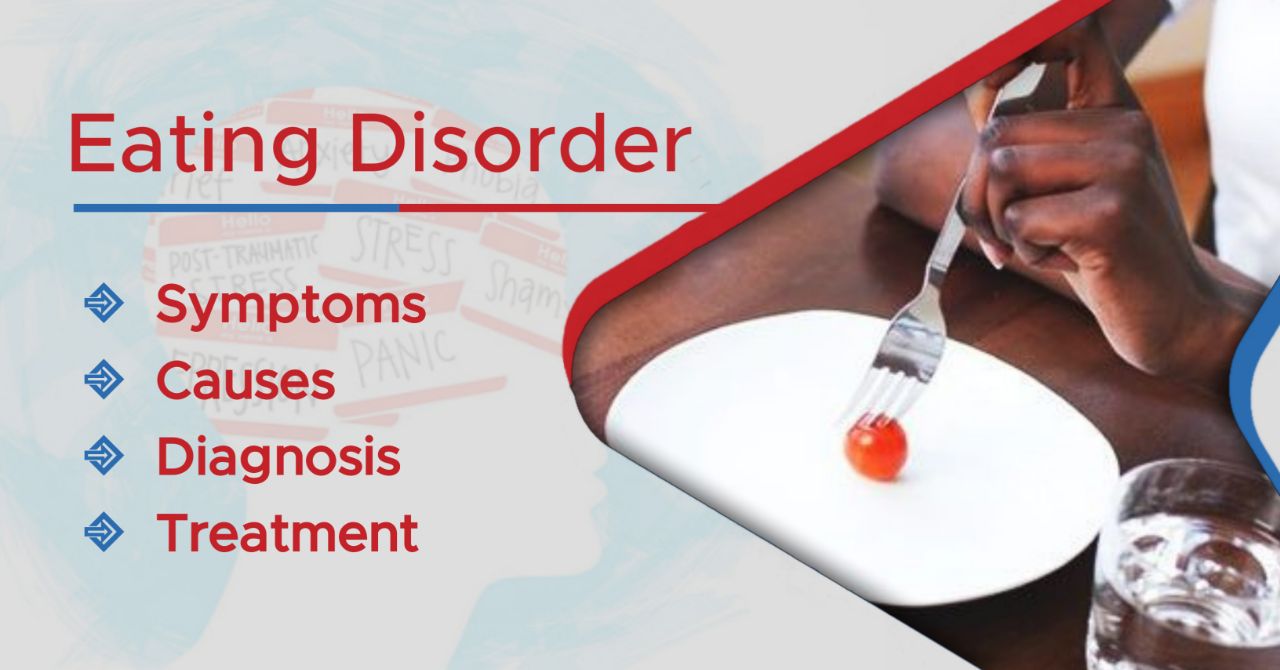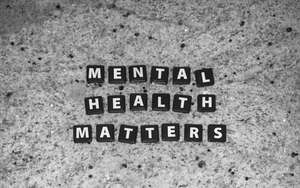
Eating Disorders
Reading Time: 5min
What are Eating Disorders?
Table of Contents
Eating disorders are serious, biologically influenced mental health conditions characterized by severe and persistent disturbances in eating behaviors and associated distressing thoughts and emotions. They can have severe consequences for physical health, psychological well-being, and overall functioning.
They are not a "lifestyle choice" or a phase. They are complex medical and psychiatric illnesses that require professional treatment.
Major Types of Eating Disorders
1. Anorexia Nervosa
Characterized by restricted food intake, leading to a significantly low body weight, an intense fear of gaining weight, and a distorted perception of body weight or shape.
Subtypes:
Restricting Type: Weight loss is accomplished through dieting, fasting, or excessive exercise.
Binge-Eating/Purging Type: The individual engages in recurrent episodes of binge eating or purging (e.g., self-induced vomiting, misuse of laxatives).
2. Bulimia Nervosa
Characterized by a cycle of recurrent episodes of binge eating (consuming an unusually large amount of food in a discrete period with a sense of loss of control) followed by compensatory behaviors to prevent weight gain.
Compensatory Behaviors: Self-induced vomiting, misuse of laxatives, diuretics, or other medications, fasting, or excessive exercise.
Self-evaluation is unduly influenced by body shape and weight.
3. Binge-Eating Disorder (BED)
Characterized by recurrent episodes of binge eating without the regular use of compensatory behaviors seen in bulimia nervosa.
Episodes are associated with eating much more rapidly than normal, eating until uncomfortably full, eating large amounts when not physically hungry, and feeling distressed, depressed, or guilty afterward.
It is the most common eating disorder in the United States.
4. Avoidant/Restrictive Food Intake Disorder (ARFID)
Previously known as "Selective Eating Disorder," ARFID is characterized by a persistent failure to meet appropriate nutritional and/or energy needs, leading to significant weight loss, nutritional deficiency, or interference with psychosocial functioning.
Key Difference from Anorexia: In ARFID, the food restriction is not driven by concerns about body weight or shape. It may be due to a lack of interest in eating, sensory sensitivities (texture, smell, color), or a fear of aversive consequences (e.g., choking, vomiting).
5. Other Specified Feeding or Eating Disorder (OSFED)
A diagnostic category for individuals who experience significant distress and impairment from eating disorder symptoms but do not meet the full criteria for the disorders listed above. This does not mean the disorder is less severe.
Examples include:
Atypical Anorexia Nervosa: All criteria for anorexia are met, except weight is within or above a normal range.
Bulimia Nervosa (of low frequency and/or limited duration):
Binge-Eating Disorder (of low frequency and/or limited duration):
Purging Disorder: Recurrent purging behavior to influence weight or shape in the absence of binge eating.
Night Eating Syndrome: Recurrent episodes of night eating, such as excessive food consumption after waking from sleep.
Warning Signs and Symptoms
Behavioral and Emotional:
Preoccupation with weight, food, calories, and dieting.
Refusal to eat certain foods or entire food categories.
Development of food rituals (e.g., excessive chewing, rearranging food on plate).
Skipping meals or eating tiny portions.
Withdrawing from social activities, especially those involving food.
Frequent comments about feeling "fat" or excessive concern with body size.
Mood swings, anxiety, or depression.
Evidence of binge eating or purging (disappearance of large amounts of food, wrappers, containers; trips to the bathroom after meals).
Physical:
Noticeable weight fluctuations (up or down).
Gastrointestinal complaints (constipation, acid reflux, etc.).
Menstrual irregularities or loss of period (amenorrhea).
Dizziness, fainting, or feeling cold constantly.
Dental problems, such as enamel erosion from vomiting.
Dry skin, hair, and brittle nails.
Causes and Risk Factors
Eating disorders arise from a complex combination of genetic, biological, behavioral, psychological, and social factors.
Genetics: Having a first-degree relative with an eating disorder increases risk.
Biological Factors: Differences in brain structure and chemistry, particularly related to neurotransmitters like serotonin and dopamine.
Psychological Factors: Perfectionism, body image dissatisfaction, history of anxiety, OCD, or trauma.
Environmental Factors: Cultural pressure for thinness, weight stigma, participation in sports or industries that emphasize weight (e.g., ballet, wrestling, modeling).
Health Consequences
Eating disorders have the highest mortality rate of any mental illness. Consequences can be severe and affect every system in the body:
Cardiovascular: Irregular heart rate, heart failure, low blood pressure.
Gastrointestinal: Pancreatitis, gastric rupture, permanent constipation.
Neurological: Seizures, cognitive impairments, fainting.
Endocrine: Loss of bone density (osteoporosis), infertility, thyroid problems.
Renal: Kidney failure from chronic dehydration.
Treatment and Recovery
Recovery is possible with early intervention and appropriate, evidence-based treatment. A team approach is often necessary, including:
Medical Care: A physician or pediatrician to monitor and treat physical health complications.
Nutritional Counseling: A registered dietitian to help normalize eating patterns and rebuild a healthy relationship with food.
Therapy:
Family-Based Treatment (FBT): The leading treatment for adolescents with anorexia and bulimia, empowering parents to help restore their child's health.
Cognitive Behavioral Therapy (CBT-E): Specifically enhanced for eating disorders, it addresses the underlying thoughts and behaviors that maintain the illness.
Dialectical Behavior Therapy (DBT): Helps build skills in mindfulness, distress tolerance, and emotion regulation.
Medication: While no medication can cure an eating disorder, antidepressants or anti-anxiety medications can help manage co-occurring conditions.
Myths vs. Facts
Myth: Eating disorders are a choice.
Fact: They are complex medical/psychiatric illnesses with strong biological roots.
Myth: Only young, white, affluent females get eating disorders.
Fact: Eating disorders affect people of all ages, races, genders, sexual orientations, and socioeconomic backgrounds.
Myth: You can tell if someone has an eating disorder by their weight.
Fact: People in larger bodies can have anorexia (atypical anorexia), and many individuals with eating disorders appear to be of "average" weight.
Myth: Eating disorders are about vanity.
Fact: They are often a maladaptive coping mechanism for managing underlying distress, trauma, or anxiety.
How to Help Someone
Express Concern Carefully: Focus on health and happiness, not weight or appearance. Use "I" statements (e.g., "I'm worried because you seem unhappy").
Avoid Simplistic Solutions: Do not say, "Just eat." It is not that simple.
Encourage Professional Help: Gently suggest seeking help from a doctor or therapist. Offer to help them make an appointment.
Be a Supportive Listener: Avoid judgment or shame. Let them know you care.
Take Care of Yourself: Supporting someone with an eating disorder is challenging; seek your own support if needed.
Key Kenyan Healthcare Providers
Your best course of action is to seek help from general psychiatrists and clinical psychologists, especially those with an interest in related issues like anxiety, OCD, or body image. They can provide diagnosis and foundational treatment.
The Chiromo Hospital Group (CGHD)
Why it's important: As a leading mental health provider, their Child and Adolescent Mental Health Service is a primary entry point. They also treat adults. They can manage the complex psychiatric and medical aspects of eating disorders.
Services: Psychiatric evaluation, medical stabilization, individual therapy, and medication management if needed.
Location: Westlands, Nairobi.
Aga Khan University Hospital, Nairobi
Why it's important: Their Department of Psychiatry can provide comprehensive assessment and ongoing therapy. You would likely work with a psychiatrist and a clinical psychologist.
Services: Psychiatric evaluation and psychotherapy.
Location: Nairobi.
Nairobi Hospital
Why it's important: Another major private hospital with a Department of Psychological Medicine.
Services: Access to psychiatrists who can diagnose and manage the condition.
Location: Nairobi.
Amani Counselling Centre & Training Institute
Why it's important: While not specializing in eating disorders, they are a well-established provider of affordable counseling and psychotherapy in Nairobi. A therapist here could provide crucial psychological support.
Services: Individual and group counseling.
Location: Nairobi.
The Treatment Team Approach
Effective eating disorder recovery often requires a team. In Kenya, you may need to assemble this team yourself:
Psychiatrist: To diagnose, manage co-occurring conditions (like depression or anxiety), and oversee the overall treatment plan.
Clinical Psychologist/Therapist: To provide evidence-based therapy such as Cognitive Behavioral Therapy (CBT-E), which is enhanced for eating disorders.
Registered Dietitian/Nutritionist: To help normalize eating patterns, address malnutrition, and rebuild a healthy relationship with food. Look for one with experience in mental health.
Physician/GP: To monitor and treat physical complications (e.g., cardiac, gastrointestinal, electrolyte imbalances).
Community and Online Support
Online Searches and Communities:
Use search terms like "eating disorder therapist Kenya," "psychologist Nairobi body image," or "dietitian Nairobi."
Facebook Groups: Search for groups related to mental health in Kenya. While there may not be a group specifically for eating disorders, groups like "Mental Health Kenya" or "Parents of Children with Special Needs Kenya" can be sources of recommendations for understanding professionals.
Crisis and General Support Helplines
While no eating disorder-specific helpline exists in Kenya, these general mental health lines can provide immediate, confidential support:
Befrienders Kenya: Offers free, confidential emotional support, especially for those feeling in distress or suicidal.
Phone: +254 722 178 177 (Check their website for current hours)
Mental 360: A psychosocial support organization that may be able to direct you to resources.
Important Considerations in Kenya
Stigma and Misunderstanding: Be prepared that friends, family, and even some healthcare providers may not understand the nature of eating disorders. Advocacy and education are often necessary.
Cost: Treatment in private facilities can be expensive. Check with your medical insurance provider to understand your mental health coverage.
Taking the First Step: If you are seeking help for yourself or a loved one, start by booking an appointment with a psychiatrist at one of the hospitals listed above. They are best equipped to conduct an initial assessment and refer you to other specialists as part of a treatment plan.
Disclaimer: This information is a guide based on available public knowledge. Services and contact details may change. Always verify directly with the healthcare providers.
















